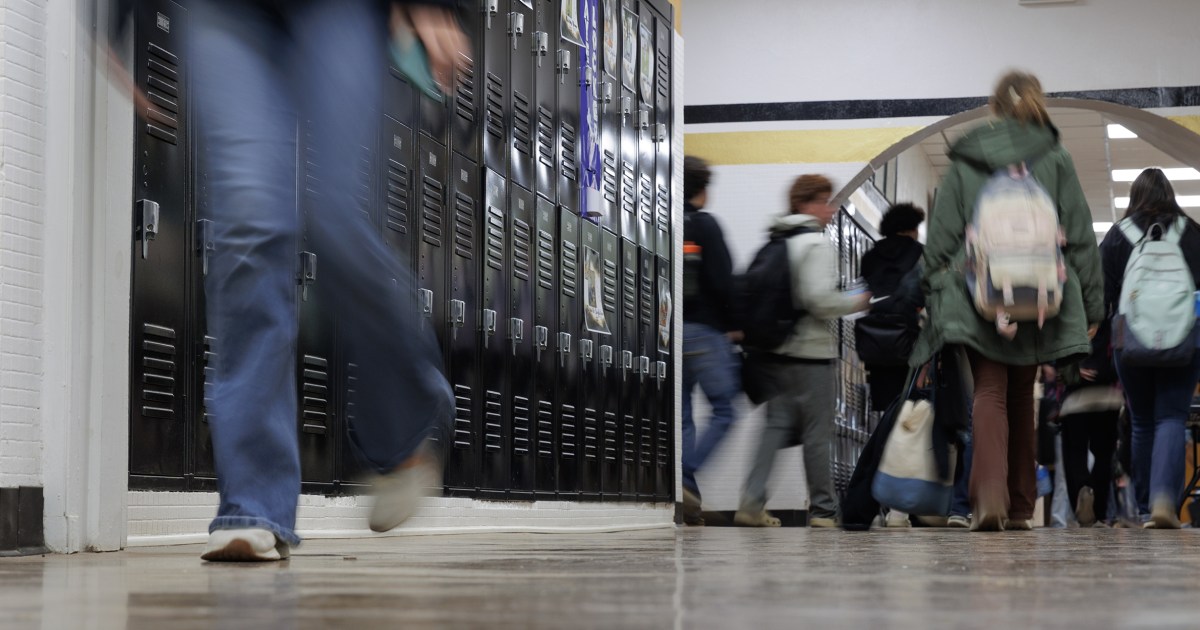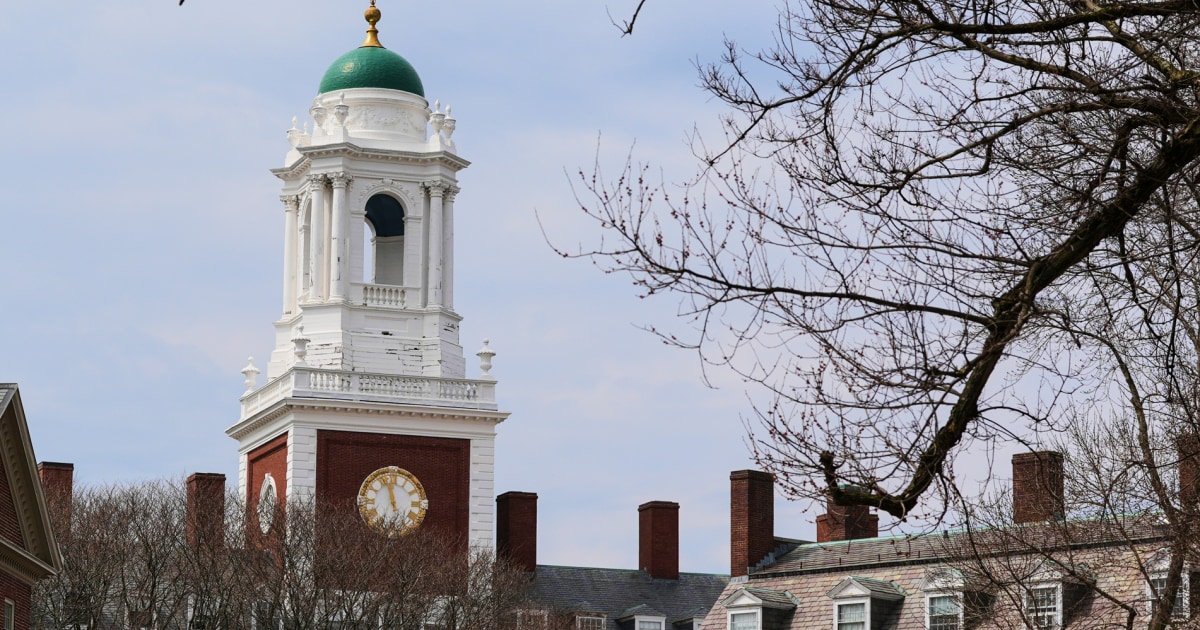Education
Trump’s dismantling of Education Department gives states ‘green light’ to pursue voucher programs

A growing number of red states have expanded their school voucher programs in recent years, a trend that is likely to only spike further amid a push led by President Donald Trump’s administration to return education “back to the states.”
Conservative education activists have long lauded such programs as a way to give greater control to parents and families. But public education advocates warn that the expansion of these voucher programs presents further risk to the broader school system as it faces peril from Trump’s dismantling of the Department of Education.
“Many states came into this administration with a track record of trying to privatize education, and I think they see this move to dismantle and defund the Department of Ed and President Trump’s support of school privatization as a green light to be more expansive in their approach moving forward,” said Hilary Wething, an economist at the left-leaning Economic Policy Institute who closely studies the impact of voucher programs on public education.
Just last week, Texas enacted a statewide private school voucher program, becoming the 16th state to offer some form of a universal school choice program. In private school voucher programs, families can receive a certain amount of public money to use toward private K-12 school tuition or school supplies. In some states, such programs have previously come with limitations, including narrow eligibility, such as private schools that can accommodate families with children who have special needs or families that are below certain income levels.
Proponents of the program in Texas and others like it dub it a “universal voucher” program because it has no restrictions on who is eligible. Under the program, any family in the state may receive about $10,000 to pay for their children’s K-12 private school education. Texas’ program will launch in the 2026-27 school year.
Statewide voucher programs are far from a new phenomenon. But they have exploded in recent years amid a growing political effort by conservatives at the local, state and federal levels to boost “school choice” — the notion that parents should have far more options than only their neighborhood public schools.
Sixteen states offer at least one voucher program that has universal eligibility, while another 14 offer voucher programs with eligibility requirements, according to the Education Law Center, a public education advocacy group that is critical of voucher programs.
At least three states, Texas, Idaho and Tennessee, have enacted their universal programs this year, while in another eight states, attempts by conservative lawmakers to create new voucher programs or expand existing ones stalled or failed, according to the National Education Association, the nation’s largest teachers union.
“Even though this is not a new explosion of voucher laws, this year continues the explosion of vouchers … and even though the USDOE [dismantling] isn’t necessarily the one driving force, it’s definitely connected,” said Jessica Levin, the litigation director at the Education Law Center, which is assisting with lawsuits challenging Trump’s moves to dismantle the Department of Education. “The bottom line is that this is a concerted strategy on the part of those who want to defund and dismantle public schools and privatize public education.”
The most prominent argument made by critics of voucher programs is that they take public money that would have otherwise been allocated to help fund public schools and deliver it to private schools.
Private schools, they note, do not face most of the accountability requirements that public schools do under federal laws. For example, private schools retain the ability to refuse admission to students, are not required to provide individualized education plans to children with learning disabilities and are not required under law to provide disabled students or students facing disciplinary measures certain protections or due process rights.
At the same time, funding formulas for public schools are predominantly based on enrollment numbers. So, as students flee public schools — even if in just small numbers — overall funding decreases.
“The students who remain in public schools lose resources,” Levin said, while “voucher students lose rights.”
Meanwhile, Levin explained, voucher-driven pupil departures from public school means “you’re now concentrating higher-need, higher-cost kids in public schools that now have less funding.”
Those situations are now compounded by Trump’s moves to wind down the Education Department, which experts have said will further upend civil rights enforcement in schools as well as the distribution of billions of dollars to help impoverished and disabled students.
U.S. Department of Education spokesperson Savannah Newhouse said in an email to NBC News that “President Trump and Secretary [Linda] McMahon believe that our nation’s students will thrive when parents are given the freedom to choose a school setting that best fits their child’s academic needs.”
Newhouse added that the administration “will provide states with best practices on how they can expand educational opportunities and empower local leaders to implement customized policy that will benefit their communities the most.”
While some states have had voucher-like programs allowing families to use public money for parochial education dating back more than 100 years, modern voucher programs have been around for about 30 years, having launched in large part in the 1990s amid a grassroots conservative movement to increase options for parents unhappy with their local public schools.
But the Covid-19 pandemic emerged as a flashpoint for conservative education activists, who utilized widespread anger among parents unhappy with school closings and remote learning as a launchpad for new and expanded voucher programs across the nation.
School voucher proponents say the programs maximize choice for parents, who can use the funds to subsidize the cost of expensive private schools, which, they argue, deliver better outcomes for students. Supporters have also touted the programs as offering a market-based approach that helps promote the best schools and have argued that they have the potential to benefit low-income families or families with uniquely few options for public school.
Tommy Schultz, the CEO of the American Federation for Children, a conservative group that advocates for school voucher programs, told Fox News this week that universal voucher programs like the one enacted in Texas give parents “education freedom.”
He praised a similar program that Florida expanded in 2023, claiming it had caused the state’s public schools to “have gotten better.” Schultz denied that Texas’ program, or ones like it, would result in fewer resources for public schools, calling that “the same argument for 30 years” by public education advocates.
Andrew Mahaleris, a spokesperson for Texas Gov. Greg Abbott, said in an email that the Republican “made education freedom a priority because no one knows the needs of their child better than a parent.”
“When it comes to education, parents matter, and families deserve the ability to choose the best education opportunities for their children,” Mahaleris added. “The Governor signing school choice into law is an unprecedented victory for Texas families, students, and the future of our great state.”
But critics point to examples showing that universal school voucher programs are disproportionately used by wealthy families whose children are already enrolled in private schools, or that children in rural areas with few schools have limited options to put the money to use. They also point to studies that refute the claim that private schools deliver better outcomes for students.
In addition, enrollment in private schools, even with a voucher to help cover the cost, can still be prohibitively expensive for low-income families, they said.
Wething, of the EPI, said analyses have shown that between 60% and 90% of students who take advantage of universal-eligibility voucher programs across the U.S. were already enrolled in private school when they participated in the programs.
She warned of the harms she said programs like the one in Texas posed.
“As soon as you get rid of income limits or carveouts for, say, only low-income families or only students with disabilities, you basically open the gates for students who are already attending private school, or who already have enough income to attend private school, to now use state funding to subsidize their private school,” she said. “It’s kind of the next step in what we think of as this voucher evolution.”
Education
Supreme Court deadlocks 4-4 on nation’s first religious charter school

WASHINGTON — Oklahoma will not be able to launch the nation’s first religious public charter school after the Supreme Court on Thursday deadlocked 4-4 in a major case on the separation of church and state.
The decision by the evenly divided court means that a ruling by the Oklahoma Supreme Court that said the proposal to launch St. Isidore of Seville Catholic Virtual School violates both the federal Constitution and state law remains in place.
As there was no majority, the court did not issue a written decision, and the case sets no nationwide precedent on the contentious legal question of whether religious schools must be able to participate in taxpayer-funded state charter school programs.
A key factor in the outcome was that conservative Justice Amy Coney Barrett, who would have been the deciding vote, did not participate in the case. She did not explain why, but it is likely because of her ties with Notre Dame Law School. The law school’s religious liberty clinic represents the school.

The one-page decision did not say how each justice voted. During oral arguments last month, most of the court’s conservatives indicated support for the school while liberals expressed concern. At least one conservative is likely to have sided with the liberals, most likely Chief Justice John Roberts.
The court will likely be asked to weigh in on the issue in future cases.
St. Isidore would have operated online statewide with a remit to promote the Catholic faith.
The case highlights tensions within the Constitution’s First Amendment; one provision, the Establishment Clause, prohibits state endorsement of religion or preference for one religion over another, while another, the Free Exercise Clause, bars religious discrimination.
The Oklahoma Supreme Court had cited the state’s interest in steering clear of Establishment Clause violations as a reason not to allow the proposal submitted by the Roman Catholic Archdiocese of Oklahoma City and the Diocese of Tulsa to move forward.
A state board approved the proposal for St. Isidore in June 2023 despite concerns about its religious nature, prompting Oklahoma Attorney General Gentner Drummond to file suit.
The case saw Drummond on the opposite side of fellow Republicans in the state who backed the idea, but he prevailed at the Oklahoma Supreme Court the following year.
The Supreme Court, when Barrett is participating, has a 6-3 conservative majority that often backs religious rights. In recent years it has repeatedly strengthened the Free Exercise Clause in cases brought by conservative religious liberty activists, sometimes at the expense of the Establishment Clause. Some conservatives have long complained that the common understanding that the Establishment Clause requires strict separation of church and state is incorrect.
Lawyers representing the school and the Oklahoma Statewide Charter School Board sought to portray the dispute as similar to a series of recent rulings in which the court said that under the Free Exercise Clause, states cannot bar religious groups from government programs that are open to everyone else.
During the oral argument, Roberts pushed back, indicating that he saw the schools case as different from the previous decisions.
Those cases, he said, “involved fairly discrete state involvement” compared with Oklahoma’s charter school program.
“This does strike me as a much more comprehensive involvement,” he added.
The push for religious public charter schools dovetails with the school choice movement, which supports parents using taxpayer funds to send their children to private school. Public school advocates see both efforts as broad assaults on traditional public schools.
Education
As colleges halt affinity graduations, students of color plan their own cultural celebrations

Graduating students of color at Harvard University and other colleges across the country would end their semester by attending affinity graduation ceremonies — but this year, they had to organize these celebrations without the school’s financial backing.
Harvard, currently battling the Trump administration over a range of issues, halted all of its affinity ceremonies for students this year. This left alumni stepping in to raise funds and students scrambling to find new spaces.
Members of the Harvard Black Alumni Society raised $46,000 for this year’s event after the university announced April 28 that it would no longer fund the ceremonies.
“This rapid response from our alumni network demonstrates the strength and commitment of our community,” Alana Brown, the society’s university relations chair, said in a statement earlier this week.
An attendee of Harvard’s canceled Lavender Graduation, which celebrates LGBTQ students, said on Facebook that a small group of students had organized an independent event.
“It was a beautiful mix of #lgtbqia young people and elders,” the attendee, Peter Khan, added. “It was an honor and privilege to be there.”
Harvard’s Asian American Alumni Alliance said on Facebook that its ceremony was important for students to experience because they provide space for recognition, solidarity, and community in the face of uncertainty. The alliance said the ceremony took place as the Trump administration announced plans to revoke student visas for international students at the university.
These actions come as the Trump administration this week asked federal agencies to potentially end their contracts with the university, worth an estimated $100 million in funding. These threats follow President Donald Trump’s executive order ending federal spending toward DEI, which he calls “radical and wasteful.”
Affinity graduations at most higher education institutions are usually optional and supplement the main commencement ceremony. They are meant to honor students’ academic achievements and cultural identities, specifically those from communities that have “historically been denied access to higher education because of who they are,” according to the Leadership Conference Education Fund, a civil rights policy think tank. This includes disabled students, people of color, Jewish and first-generation students, among others.
The university joins many others across the nation that have canceled affinity graduations after the federal crackdown on funding for colleges. Notre Dame canceled its Lavender Graduation for 50 LGBTQ students, with members of the university’s Alumni Rainbow Community and the Notre Dame Club of Greater Louisville stepping in to host an independent ceremony this month.
Wichita State University, the University of Louisville and the University of Kentucky also canceled some or all of its affinity ceremonies. The Hispanic Educators Association of Nevada said it canceled its event for Latino students because of a lack of financial support.
Harvard University did not respond to NBC News for a request to comment. Earlier this year, the college announced it would “no longer provide funding, staffing, or spaces for end-of-year affinity celebrations. Under the new auspices of Community and Campus Life, the University is building inclusive traditions that reflect the richness of every student’s experience and reinforce our shared identity as one Harvard community.”
Jean Beaman, an associate professor of sociology at the Graduate Center of The City University of New York, said affinity graduations also recognize the range “of challenges and obstacles that students who come from various minoritized populations at predominantly white institutions face as they work towards their degrees.”
One example she cites is affinity graduations for Black students, which speak to “the ways that our accomplishments are not just ours, but also something in line with that of our ancestors and the hurdles of our ancestors, and making that more central to the festivities that you would have in a ‘typical’ graduation.”
Beaman calls the affinity graduation cancellations nationwide “a very disturbing development,” since she said many seem to be acting based on Trump’s executive orders and not on the law.
“It’s a way in which institutions of higher education are participating in anticipatory obedience,” Beaman said.
The Maricopa County Community Colleges District in Arizona canceled a ceremony for Indigenous students within the past few weeks, citing “new enforcement priorities set by the U.S. Department of Education’s Office for Civil Rights,” which affect “programs and activities that focus solely on race, identity, or national origin,” according to an email obtained by NBC News.
Collin Skeets, a member of the Navajo Nation who received his associate degree in secondary education this month from Mesa Community College, said that “it was pretty heartbreaking” and that he even shed some tears over the cancellation. Once again he said he felt like he was again being told “no” after the history of hardships his own Indigenous ancestors had endured in continuing their education.
“Just knowing that I was able to graduate was just an unbelievable feeling, it’s hard to put into words,” said Skeets, who is 36 and a first-generation college student. He said he was looking forward to wearing his traditional clothing to graduation and celebrating with other Indigenous students.
Eventually the Salt River Pima-Maricopa Indian Community intervened, holding a ceremony on its reservation near Scottsdale. Skeets said he felt “so much better” knowing he could share the experience with family and even spoke at the ceremony
“Things kind of fell through at first but then came back and all meshed together in a way that I was able to celebrate with family again and achieve this milestone in my life,” he said.
Beaman of CUNY said she hopes schools will “put their foot down” against the cancellations in the future. Holding affinity graduations off-campus is a “testament of their will and determination,” she said of students, adding that it likely helped them obtain their degrees.
“It’s also a reminder that — both presently and historically — students have often had to be the vanguard of change in institutions of higher education, particularly predominantly white institutions, and I see this as no different from that.”
Education
Judge halts dismantling of Education Department, orders fired workers to be reinstated

A federal judge in Massachusetts on Thursday issued an injunction blocking the Trump administration from dismantling the Department of Education and ordering that fired employees be reinstated.
“The record abundantly reveals that Defendants’ true intention is to effectively dismantle the Department without an authorizing statute,” U.S. District Judge Myong Joun wrote, noting “the Department cannot be shut down without Congress’s approval.”
The judge said an injunction was necessary because “The supporting declarations of former Department employees, educational institutions, unions, and educators paint a stark picture of the irreparable harm that will result from financial uncertainty and delay, impeded access to vital knowledge on which students and educators rely, and loss of essential services for America’s most vulnerable student populations.”
Prior to the mass firings, or reduction in force, “the Department was already struggling to meet its goals, so it is only reasonable to expect that an RIF of this magnitude will likely cripple the Department,” Joun wrote.
A spokesperson for the Education Department, Madi Biedermann, said officials “will immediately challenge this on an emergency basis.”
The cuts were announced after President Donald Trump pledged to shutter the department, and days before he issued an executive order directing Education Secretary Linda McMahon to “take all necessary steps to facilitate the closure of the Department of Education,” the judge noted.
In her confirmation hearing, McMahon testified that the administration would not attempt to abolish the department without congressional approval, as required by law, and said that she would present a plan that senators could get on board with.
“We’d like to do this right,” she said, adding that shutting down the department “certainly does require congressional action.”
The judge wrote that the administration also acknowledged in court filings that “the Department cannot be shut down without Congress’s approval, yet they simultaneously claim that their legislative goals (obtaining Congressional approval to shut down the Department) are distinct from their administrative goals (improving efficiency).”
“There is nothing in the record to support these contradictory positions,” the judge added.
“Not only is there no evidence that Defendants are pursuing a ‘legislative goal’ or otherwise working with Congress to reach a resolution, but there is also no evidence that the RIF has actually made the Department more efficient. Rather, the record is replete with evidence of the opposite,” he wrote.
While administration says the reduction in force “was implemented to improve ‘efficiency’ and ‘accountability,’” the judge wrote, the “record abundantly reveals that Defendants’ true intention is to effectively dismantle the Department without an authorizing statute.”
He ordered the administration not to implement Trump’s order, and said it must reinstate federal employees whose employment was terminated on or after Jan. 20. The judge said those moves were necessary “to restore the Department to the status quo such that it is able to carry out its statutory functions.”
It also blocks the department “from carrying out the President’s March 21, 2025 Directive to transfer management of federal student loans and special education functions out of the Department.”
Biedermann, the Education Department spokesperson, blasted the judge in a statement and said the ruling “is not in the best interest of American students or families.”
“Once again, a far-left Judge has dramatically overstepped his authority, based on a complaint from biased plaintiffs, and issued an injunction against the obviously lawful efforts to make the Department of Education more efficient and functional for the American people,” the statement said.
“President Trump and the Senate-confirmed Secretary of Education clearly have the authority to make decisions about agency reorganization efforts, not an unelected Judge with a political axe to grind,” Biedermann added.
Randi Weingarten, the president of the American Federation of Teachers, one of the plaintiffs in the case, praised the ruling, which she said “rightly rejected one of the administration’s very first illegal, and consequential, acts: abolishing the federal role in education.”
“This decision is a first step to reverse this war on knowledge and the undermining of broad-based opportunity,” she said in a statement.
-

 Asia4 days ago
Asia4 days agoIndonesia’s Mount Lewotobi Laki Laki erupts sending ash 11 miles into sky
-

 Africa4 days ago
Africa4 days agoCairo telecom fire injures 14, disrupts internet nationwide
-

 Europe3 days ago
Europe3 days agoHe was born to a US citizen soldier on an army base in Germany. Now he’s been deported to Jamaica, a country he’d never been to
-

 Asia3 days ago
Asia3 days agoA torpedoed US Navy ship escaped the Pacific in reverse, using coconut logs. Its sunken bow has just been found
-

 Europe2 days ago
Europe2 days agoTrump promised 200 deals by now. He’s gotten 3, and 1 more is getting very close
-

 Africa4 days ago
Africa4 days agoKenya: at least 10 dead in ongoing protests, 29 injured nationwide
-

 Lifestyle3 days ago
Lifestyle3 days agoArmani couture channels black as maestro misses Paris bow for 1st time, days from 91st birthday
-

 Africa3 days ago
Africa3 days agoUN Human Rights Office says ‘deeply troubled’ by Kenya protester deaths




